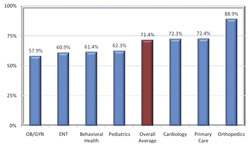
Why transform healthcare? There are three things most people will agree on when asked this question. First, healthcare is expensive—it currently consumes 16 percent of our gross domestic product and continues to rise. We spend one out of every six dollars on healthcare. Second, it is imperfect—a RAND study showed Americans get only half the recommended care they need. Only 2.5 percent of our nation’s population receives all the right care. And third, our healthcare system is ineffective. Local data from the Caterpillar Inc. Healthy Balance program, gathered from self-reported employee surveys, found that only 12 percent of CAT employees who participated in the program have a fully healthy lifestyle. This means the individual has a normal body mass index, does not smoke, eats a healthy diet, exercises and limits alcohol consumption.
Illinois Healthcare Rankings
In central Illinois, we have respected and mission-driven healthcare institution s, as well as highly-trained clinicians, world-class companies and a caring community. Area residents do not have to travel to a distant city to find the care they need.
s, as well as highly-trained clinicians, world-class companies and a caring community. Area residents do not have to travel to a distant city to find the care they need.
However, a state snapshot of how Illinois compares to the other 49 states in performance of our healthcare system leaves something to be desired. The Commonwealth Fund (commonwealthfund.org) issued a State Scorecard in 2007 comparing states on healthcare access, quality, avoidable hospital use and costs, equity, and healthy lives. Illinois came in 36th in the overall state ranking.
In 2008, a Commonwealth Fund report examined state child healthcare systems. Illinois was in the bottom quartile based on access, quality, cost, healthy lives and equity. Surely, there is room for improvement.
Today’s Realities
Today’s reality for participants in the healthcare arena is important to understand. Physicians and hospitals compete for available healthcare dollars. They practice in a fee-for-service production model where doing more is financially rewarded. Taking time away from seeing patients to work in quality improvement means lost income. Health plans and employers faced with rapidly escalating costs focus on reducing short-term costs, which often results in employees having fewer healthcare benefits and providers’ fee schedules being squeezed. Consumers are taught that more is better and often demand services that bring them no benefit. Under the status quo, consumers have to navigate a fragmented, complex and confusing system.
A New Vision
Imagine a new healthcare system where…
Employers:
- Maintain and enhance their benefits
- See the value they are getting
- Pay for outcomes, not quantity
- Focus on their core business
Physicians:
- Provide input and are heard and valued
- Have the time they need to care for patients
- Enjoy fewer administrative hassles
- Compete on quality and value.
Patients:
- Have a personal care team
- Are educated and supported when weighing treatment trade-offs
- Are up-to-date on preventive and chronic care
- Have a personal health record.
Is such a vision a pipedream? Absolutely not.
Quest Strategy
The vision of Quality Quest for Health is to become the region with the healthiest people and the highest-value healthcare. Yet, how do we define and measure value when it comes to healthcare services? For the most part, we don’t. Patients hope they receive quality services—whether it is a physician’s office visit, a test, treatment or surgery. Value in healthcare is difficult to determine when:
- Quality of care varies dramatically between doctors and hospitals, but those differences are invisible to patients and providers.
- Payments reward quantity over quality and fixing problems over preventing them.
- Lack of standard performance results makes it impossible to know which practices are doing a good job, and those which are not.
- Consumers lack information to make the choices that are right for them. (Pacific Business Group on Health)
Quest defines value in healthcare services as the quality of care administered divided by the cost to provide that care. In other words, the patient’s outcomes and experience are the most important part of the equation. The value of the services provided is highest when the patient has a positive result, good experience, the cost for such services is fair and equitable, and practices have streamlined processes.
The role of Quest in the value equation is bringing healthcare participants— clinicians, hospitals, health plans, employers and consumers— to the same table to agree on areas where we can work together and then drive quality health improvements in our community.
An important part of Quest’s strategy to improve community health is looking at healthcare from a broader perspective—a population view of health. Population health seeks to improve the health of an entire group (population) of people. Besides medical care, other factors may include income, gender, culture, personal health practices, physical environments, social support networks, education, employment and working conditions. Strategies that are critical to advancing a population view of health are:
- Health is a collective responsibility. It takes all healthcare stakeholders working together to have a positive impact.
- Preventing illness and promoting health work hand in hand.
- All actions must be based on scientific evidence that is shown to be effective and safe. On balance, across all people, benefits must outweigh risk of harm.
Quest Teams
Quest Teams are composed of healthcare and business professionals and consumers who volunteer their time to research and address a specific health topic. Our teams use Six Sigma methods to get at the heart of an issue and define real solutions. Some of our current projects include: affordable medications, healthy lifestyles, preventive care, reducing heart attacks and strokes, and high-quality colonoscopy.
Measurement and Reporting Until recently, most physician practices have had little information  comparing the quality of patient care they provide to that of their peers. This is changing. Health plans, employers and the Centers for Medicare and Medicaid Services have begun asking physicians to measure and report their performance.
comparing the quality of patient care they provide to that of their peers. This is changing. Health plans, employers and the Centers for Medicare and Medicaid Services have begun asking physicians to measure and report their performance.
Multiple initiatives to increase physicians’ accountability for their performance have developed across the country. Many, like Quest, are regional and statewide collaboratives. Measurement and public reporting helps physician practices and hospitals compare their results to other practices and motivates them to improve the quality of care they deliver. Research shows that measurement and public reporting really do improve care. Publishing results also gives patients access to information they can use to make better healthcare decisions.
Education and Outreach
Quest hosts medical conferences where regional and national experts share their experiences and success stories of healthcare transformation. We will be offering a program on preventive care in early September 2009 for healthcare providers and consumers. We also work to improve community health by educating consumers and providing tools for individuals to take charge of their own health. iBi

